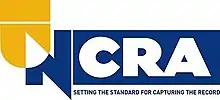National Court Reporters Association
The National Court Reporters Association, or NCRA, is a US organization for the advancement of the profession of the court reporter, closed captioner, and realtime writer. The association holds annual conventions, seminars and forums, speed and real-time contests, and teachers' workshops to assist court reporters.
 | |
| Formation | 1899 |
|---|---|
| Type | Non-profit |
| Purpose | Court reporting industry |
| Location | |
Membership | 20,000 |
Main organ | Journal of Court Reporting |
| Website | www |
Reporters can join NCRA for a fee that varies depending on whether the applicant is a student, teacher, or reporter. Membership allows a reporter to take the certifications, get discounts on conventions, attend conferences, and have access to a network of other professionals in the field.
History
NCRA was established in 1899 in Chicago, Illinois, United States, as the National Shorthand Reporters Association (NSRA). They created standardization of ethical codes, transcript rates, and information for all shorthand reporters. They published "The Shorthand Writer" and started the National Speed Contest, which is still held today. NCRA developed the first standardized test for court reporters to gauge their proficiency. Called the Certificate of Proficiency, it was replaced by the Registered Professional Reporter.
Membership with NCRA
NCRA supports individuals through education and certification, promotion of the stenographic profession throughout the legal industry, and defense of the industry in government. NCRA provides news and information to its members through email newsletters and its JCR magazine, as well as on its website. Industry professionals benefit from membership with NCRA by broadening their network, bringing them new business, personal and career enhancements, and receiving access to information and education.
Standardized tests
NCRA offers three main certifications:[1]
- RPR, Registered Professional Reporter
- RMR, Registered Merit Reporter
- RDR, Registered Diplomate Reporter, the highest certification designated by NCRA
They have established seven other certification programs:
- CRR, Certified Realtime Reporter
- CBC, Certified Broadcast Captioner
- CCP, Certified CART Provider
- CRC, Certified Realtime Captioner
- CLVS, Certified Legal Video Specialist
- CRI, Certified Reporting Instructor
- MCRI, Master Certified Reporting Instructor
- CMRS, Certified Manager of Reporting Services
- CPE, Certified Program Evaluator
- RSA, Realtime Systems Administrator [2]
The written knowledge portion of the exams is offered four times a year at Pearson VUE Professional Centers, and the skills portion of the exams is offered twice a year at NCRA-sponsored testing sites.
Steno Contests
Steno contests are held annually at the NCRA Annual Convention and Exhibition in two categories: Speed and Realtime.
- 2010 Speed Contest
Mark Tod Kislingbury of Houston, Texas, won the 2010 speed contest with an accuracy of 99.228% topping a field of 36 competitors. Deanna Boenau of Sarasota, Florida, won the 2010 realtime contest with an accuracy of 98.667% topping a field of 40 competitors.[3]
- 2011 Speed Contest
Alan H. Brock, RDR, CRR, of Boston, Mass., won the 2011 speed contest with an accuracy of 99.265%.[4] JoAnn Bryce, RMR, CRR, of Castro Valley, Calif., won the 2011 realtime contest with an accuracy of 99.039%.[5]
- 2012 Speed Contest
Sherry Bryant, RMR, CRR, of Harrisburg, Pa., won the 2012 speed contest with an accuracy of 99.380%.[6] Tammy Milcowitz, RMR, CRR, CBC, CCP, of Oldsmar, Fl., won the 2012 realtime contest with an accuracy of 99.583%.[7]
- 2013 Speed Contest
Dana Hayden, RMR, CRR, of Huntsville, Ark., won the 2013 Speed Contest with an accuracy of 99.569%.[8] Jo Ann Bryce, RMR, CRR, of Castro Valley, Calif., won the 2013 realtime contest with an accuracy of 99.717%.[9]
Perfect Speed Contest Papers[10]
| 280 Q&A | J. Edward Varallo | 1975 | (NSRA) |
Only NCRA Speed Champion in four different decades[10]
| J. Edward Varallo | 1974, 1975, 1976, 1986, 1996, 2006 | |
Certified Schools
Although the NCRA is not an accrediting agency, they have established general requirements and minimum standards expected of a court reporting school. The following schools have met those requirements as of 2012:[11]
- Gadsden State Community College
- Prince Institute of Professional Studies
- Bryan College of Court Reporting
- Sage College
- South Coast College
- West Valley College
- Marin Community College
- Prince Institute
- Atlantic Technical Center
- Erwin Technical Center
- Key College
- Sheridan Technical Center
- Brown College of Court Reporting
- MacCormac College
- Midstate College
- South Suburban College
- College of Court Reporting Inc.
- Academy of Court Reporting
- Macomb Community College Center for Cont. Edu
- Anoka Technical College
- StenoTech Career Institute, Fairfield
- StenoTech Career Institute, Piscataway
- Alfred State College
- Business Informatics Center
- Long Island Business Institute
- New York Career Institute
- Clark State Community College
- Cuyahoga Community College
- Miami-Jacobs Career College, Columbus
- Miami-Jacobs Career College, Independence
- Miami-Jacobs Career College, Sharonville
- Stark State College of Technology
- Stautzenberger College, Brecksville
- Stautzenberger College, Maumee
- Community College of Allegheny County
- Orleans Technical Institute
- Alvin Community College
- Arlington Career Institute
- Court Reporting Institute of Dallas
- Court Reporting Institute of Houston
- Kussad Institute of Court Reporting
Canada
- Canadian Centre for Verbatim Studies
- Northern Alberta Institute of Technology
References
- NCRA Certifications, National Court Reporters Association.
- http://www.ncra.org/Certifications/content.cfm?ItemNumber=8796
- 2010 Steno Contest Winners, National Court Reporters Association.
- 2011 Speed Contest Winners, National Court Reporters Association.
- 2011 Realtime Contest Winners, National Court Reporters Association.
- 2012 Speed Contest Winners, National Court Reporters Association.
- 2012 Realtime Contest Winners, National Court Reporters Association.
- National Court Reporters Association.
- , National Court Reporters Association.
- "Gallery of Shorthand - Historical Narratives". Retrieved 2016-08-23.
- , National Court Reporters Association.